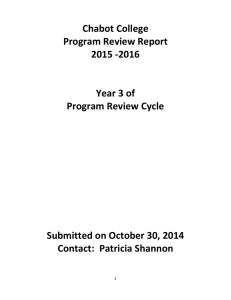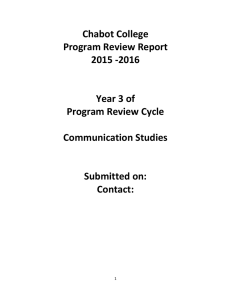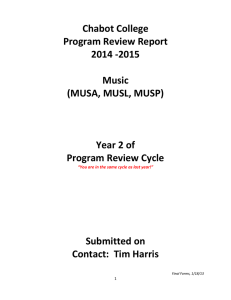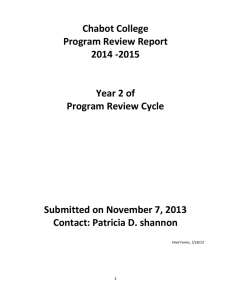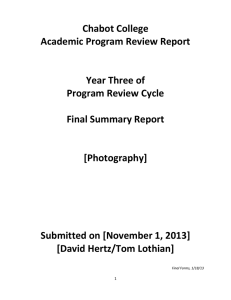Chabot College Academic Services Program Review Report
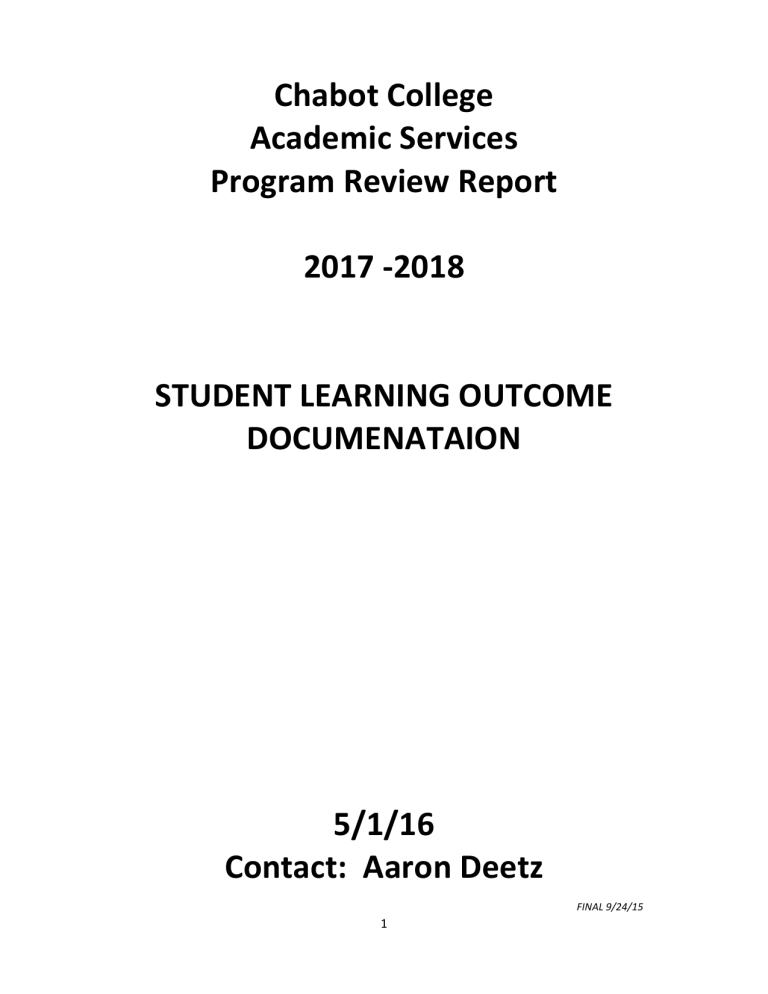
Chabot College
Academic Services
Program Review Report
2017 -2018
STUDENT LEARNING OUTCOME
DOCUMENATAION
5/1/16
Contact: Aaron Deetz
1
FINAL 9/24/15
Appendix B: “Closing the Loop” Course-Level Assessment Reflections.
Course
Semester assessment data gathered
Number of sections offered in the semester
Number of sections assessed
Percentage of sections assessed
Semester held “Closing the Loop” discussion
Faculty members involved in “Closing the Loop” discussion 2
1
1
PHOT 62
Fall 2015
100%
Fall 2015
Form Instructions:
• Complete a separate Appendix B2 form for each Course-Level assessment reported in this
Program Review. These courses should be listed in Appendix B1: Student Learning Outcomes
Assessment Reporting Schedule.
• Part I: CLO Data Reporting .
For each CLO, obtain Class Achievement data in aggregate for all sections assessed in eLumen.
• Part II: CLO Reflections .
Based on student success reported in Part I, reflect on the individual
CLO.
• Part III: Course Reflection.
In reviewing all the CLOs and your findings, reflect on the course as a whole.
P
ART
I: C
OURSE
-L
EVEL
O
UTCOMES
– D
ATA
R
ESULTS
C
N
ONSIDER
T
UMBER OF
HE
C
CLO
OURSE
-L
EVEL
O
UTCOMES
S WILL DIFFER BY COURSE
I
NDIVIDUALLY
« )
(
THE
(CLO) 1:
Develop a cohesive body of exhibition quality work that demonstrates technical mastery of photographic materials and processes.
(CLO) 2:
Able to articulate conceptual meaning and content of photographic works presented in the final portfolio.
Defined Target
Scores*
(CLO Goal)
70% of students score a 3 or 4
(meet the CLO).
70% of students score a 3 or 4
(meet the CLO).
Actual Scores**
(eLumen data)
Based on the final portfolio, 64% of students met the target goal.
Based on the final portfolio, 73% of students met the target goal.
(CLO) 3:
Able to understand the relationship between multiple images and the sequencing of photographs within a portfolio.
70% of students score a 3 or 4
(meet the CLO).
Based on the final portfolio, 91% of students met the target goal.
(CLO) 4:
« If more CLOs are listed for the course, add another row to the table.
* Defined Target Scores : What scores in eLumen from your students would indicate success for this
CLO? (Example: 75% of the class scored either 3 or 4)
**Actual scores: What is the actual percent of students that meet defined target based on the eLumen data collected in this assessment cycle?
2
P
ART
II: C
OURSE
-
LEVEL
O
UTCOME
R
EFLECTIONS
A.
C OURSE -L EVEL O UTCOME (CLO) 1:
1.
How do your current scores match with your above target for student success in this course level outcome?
Scores did not meet the target outcome for students. However, assessment results suffered from the fact CLO #1 was assessed during midterm critiques prior to the students completing the finished portfolio. Waiting until the end of the semester when final portfolios are presented will result in a higher student success rate for CLO #1.
2.
Reflection: Based on the data gathered, and considering your teaching experiences and your discussions with other faculty, what reflections and insights do you have?
CLO and assessment target are appropriate.
B.
C
OURSE
-L
EVEL
O
UTCOME
(CLO) 2:
1.
How do your current scores match with your above target for student success in this course level outcome?
Scores meet the target outcome for student success.
2.
Reflection: Based on the data gathered, and considering your teaching experiences and your discussions with other faculty, what reflections and insights do you have?
CLO and assessment target appropriate.
C.
C OURSE -L EVEL O UTCOME (CLO) 3:
1.
How do your current scores match with your above target for student success in this course level outcome?
Scores far exceed the target outcome for student success.
2.
Reflection: Based on the data gathered, and considering your teaching experiences and your discussions with other faculty, what reflections and insights do you have?
CLO and assessment target appropriate.
3
P
ART
III: C
OURSE
R
EFLECTIONS AND
F
UTURE
P
LANS
1.
What changes were made to your course based on the previous assessment cycle, the prior
Closing the Loop reflections and other faculty discussions?
Being a new faculty hire for the 2014/2015 academic year I did not participate in previous assessment cycles. The photography program is being reactivated for the first time in a number of years.
2.
Based on the current assessment and reflections, what course-level and programmatic strengths have the assessment reflections revealed? What actions has your discipline determined might be taken as a result of your reflections, discussions, and insights?
PHOT61 CLO’s were assessed during midterm critiques, Fall 2015. For this assessment cycle, midterm critiques were appropriate assessment tools for CLO #2 and CLO #3.
However for CLO #1 the midterm critique was not an appropriate assessment tool. The final presentation of student portfolios would be a more appropriate assessment tool to judge student success for CLO #1. As a result the student success rates for CLO #1 suffered.
3.
What is the nature of the planned actions (please check all that apply)?
ü Curricular
Pedagogical
Resource based
ü Change to CLO or rubric
ü Change to assessment methods
Other:_________________________________________________________________
Appendix C: Program Learning Outcomes
Considering your feedback, findings, and/or information that has arisen from the course level discussions, please reflect on each of your Program Level Outcomes.
Program: Photography, Associate in Arts
• PLO #1: Demonstrate technical mastery of manual camera operation utilizing multiple formats: SLR (film), DSLR (digital).
• PLO #2: PLO #2: Demonstrate technical mastery making a photographic print utilizing multiple formats: Gelatin Silver (film), Inkjet (digital), Alternative Process (film/digital).
• PLO #3: Effectively communicate a unique vision through personal artistic expression, compositional awareness, and conceptual meaning.
• PLO #4: Familiarity with contemporary and historical photographers. Ability to discuss photography in terms of technical merit, aesthetic value, and conceptual meaning.
4
What questions or investigations arose as a result of these reflections or discussions?
The photography program is being reactivated for the first time in a number of years. 2014/2015 was the first academic year that the PLO’s have been implemented. The PLO’s have not been assessed yet.
What program-level strengths have the assessment reflections revealed?
The photography program is being reactivated for the first time in a number of years. 2014/2015 was the first academic year that the PLO’s have been implemented. The PLO’s have not been assessed yet.
What actions has your discipline determined might be taken to enhance the learning of students completing your program?
The photography program is being reactivated for the first time in a number of years. 2014/2015 was the first academic year that the PLO’s have been implemented. The PLO’s have not been assessed yet.
5
